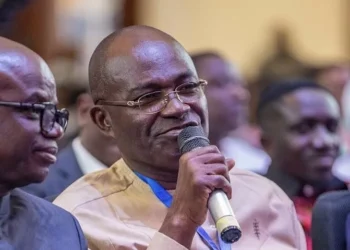Bright Simons, Honorary Vice President of IMANI Centre for Policy and Education, has questioned the surprise expressed by Ghanaians in the illegally repackaged and distributed of over 15,000 bags of expired and contaminated rice to Senior High Schools (SHSs) nationwide.
Bright Simons noted that such scandals are not new and questioned the collective surprise expressed by the public and even government agencies.
According to Simons, the issue is emblematic of a deeply entrenched culture where government policies are converted into opportunities for party loyalists, sidelining ethical considerations and quality control.
“It all started when the political jobbers whose duty it is to convert government policies to ‘cash for the boys’ decided to bring party people onboard to supply food to secondary schools.”
Bright Simons, Honorary Vice President of IMANI Centre for Policy and Education
Bright Simons further highlighted the structural vulnerability created by the Free SHS program, which stripped headmasters of control over food procurement, transferring authority to government-appointed suppliers.
The company at the center of the controversy, identified as Lamens, has ties to influential figures within the ruling NPP.
Bright Simons revealed that one of its key leaders is associated with the “Kejetia Elephant Movement Association,” a group linked to the party.
These political connections allegedly allowed the company to secure lucrative government contracts for supplying food, including rice, canned fish, and tinned milk, to schools under Ghana’s flagship Free Senior High School (Free SHS) program.
The food distributed by Lamens reportedly showed clear signs of contamination, such as discolored grains and a foul smell, according to whistleblowers and initial audits. Bright Simons underscored that the problem goes beyond mere expiry dates.
“Expiration is just one aspect of the issue. Once you see signs of unwholesomeness, you expedite the shelf-life and dispose [of it]. You don’t extend the expiry date on the label.”
Bright Simons, Honorary Vice President of IMANI Centre for Policy and Education
These actions contravene international food safety standards, such as those outlined by the Codex Alimentarius.
Auditor-General’s Warnings Ignored

The revelation of contaminated rice is not the first warning sign. The Auditor-General flagged similar concerns as far back as 2020, raising alarm about the quality of food being supplied to schools.
However, little action was taken to address these findings. Simons noted that such warnings were ignored because the system prioritizes political patronage over accountability.
“This issue of Lamens importing unwholesome food (rice just being the latest) is widely known across secondary schools,” Simons stated. “Even the Public Accounts Committee, nominally bipartisan, has not seen the need to pursue the matter.”
This scandal is not an isolated incident but part of a broader systemic issue in Ghana’s governance and food supply chain. According to Simons, the system has been engineered to benefit political jobbers and “cash-for-boys” schemes, with little regard for public safety or ethical standards.
“No investigation will go anywhere because this is a systemic issue that has been tolerated for years,” Simons remarked. His statement reflects widespread cynicism about the country’s ability to hold powerful individuals accountable, especially when their actions benefit from political protection.
Simons highlighted the need to go beyond focusing solely on expiry dates to address broader issues of inventory fraud, contamination, and systemic corruption.
Parents and civil society organizations are also demanding transparency from the government regarding the health impacts of contaminated food on students.
“We must establish whether the upsurge in chronic diseases among teens is linked to these practices,” Simons stressed, calling for comprehensive studies and health interventions.
The distribution of expired and contaminated rice to Ghanaian schools is a damning indictment of the country’s governance and accountability structures.
It highlights the dangers of prioritizing political patronage over public welfare, particularly in critical sectors like education. Without immediate and decisive action, the lives and futures of Ghana’s youth remain at risk.
READ ALSO: Pence Opposes Kennedy’s Nomination As Health Secretary






















